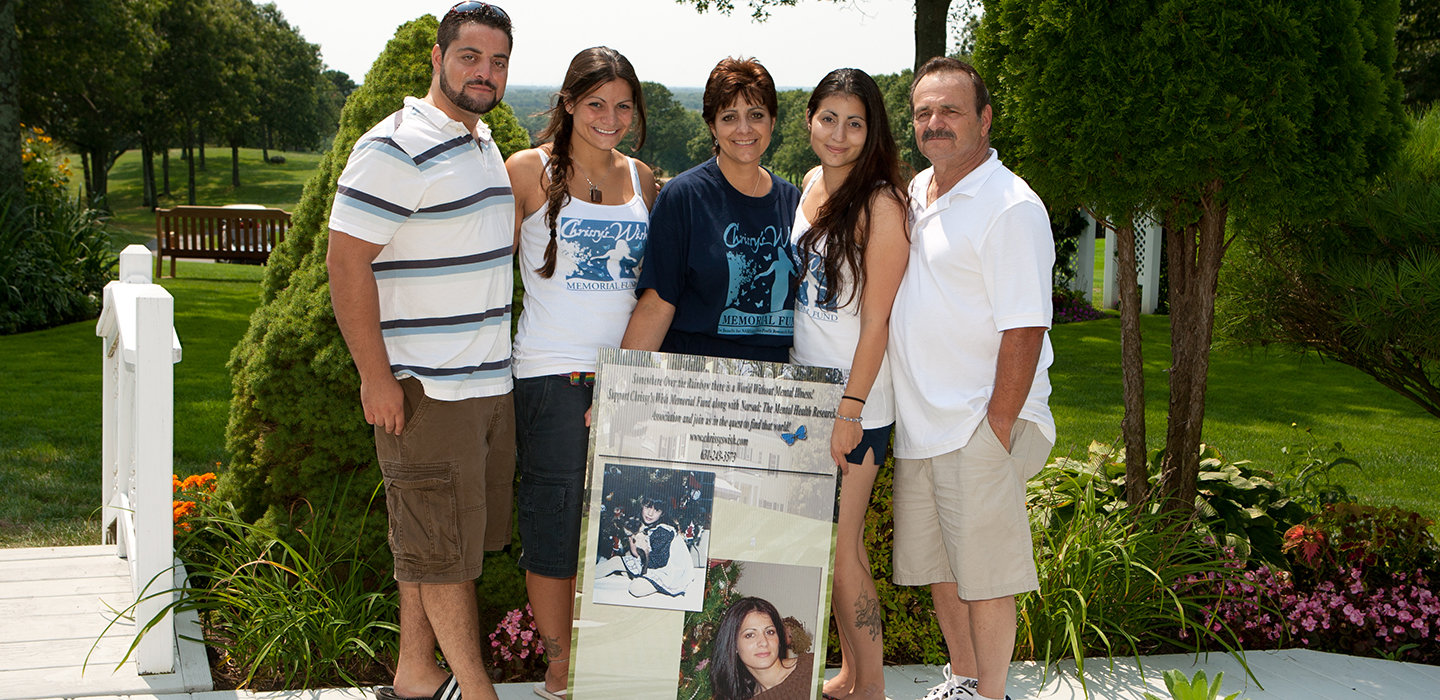Chrissy’s Wish Fulfills a Promise to a Beloved Daughter
From The Quarterly, September 2016
In the week following his daughter’s suicide, Mario Rossi discovered more than 150 medical books and journals scattered in the basement of her Queens, New York home. Twenty-six-year-old Chrissy had been searching for answers in these books, scribbling notes, leaving Post-its and highlighting passages. But the answers she was looking for could not be found even in the most cutting-edge medical research.
Her mother, Linda, sat on the living room floor, the books in a circle around her. She realized that Chrissy had left them a quest. She made a promise to her daughter that her death would not be in vain. Linda would do something to find the answers her daughter was searching for.
Chrissy was first diagnosed with clinical depression when she was 14 years old, an active and athletic freshman in high school. Since the age of six, Chrissy had been a gifted gymnast, competing in high school-level events, even while in elementary school.
When she developed Bell’s Palsy at age 13, her doctors recommended that she take a break from gymnastics. Life for a teenager is difficult enough, with all the normal developmental and emotional undercurrents. In this case, Chrissy was thrown into turmoil after having to leave the one activity and peer group around which her life revolved. She became withdrawn and isolated.
One day Linda got a call from the school counselor. Chrissy had told him she wanted to die, but wouldn’t do it because she didn’t want her mother to find her.
For the next decade, Chrissy drifted from doctor to doctor, therapist to therapist. She was hospitalized multiple times, once after a suicide attempt. Doctors placed her on various medications for her depression, and she often found herself in a whirlwind of severe side effects. Sometimes the drugs would work for a while and then stop.
Chrissy struggled to lead a normal life. She sought independence but was trapped by her symptoms and the unwanted side effects of the various drugs she was prescribed.
At 21, she went into a deep depression and drank a bottle of cough medication. It was a cry for help: She called Linda as soon as she did it. After being hospitalized for a few weeks, she was put on high doses of a combination drug therapy. As a result, her eyes were unable to focus, and her hands shook so much she couldn’t write. Her tremors were so bad and her eyes so blurry that she failed her final exam after training to become an ultrasound technician. Though disappointed and frustrated, Chrissy fought hard to stabilize her life. For about a year, she worked at a real estate office.
In April 2006, Linda began to realize that Chrissy was slipping back into depression. She encouraged her to go back to a therapist but Chrissy resisted saying, “this time is different.” She broke up with her boyfriend, whom she had been planning to marry, saying “he deserved to have a normal life and needed to find someone he could be happy with.”
While away on a trip, Linda got a call from Chrissy: “I don’t know what to do, I’m just so depressed, I am waiting for you, mom!”
Linda recognized these signs that her daughter was tumbling downward and took Chrissy to see a new psychiatrist who put her on a new medication. From that day forward Linda slept over at Chrissy’s each night, while her husband would stay with her during the day.
On July 21, 2006, Chrissy went over to her parents’ home and stayed for an hour. She told them her friend Dave was going to stay over that night and reassured them that she was fine. She kissed them goodbye, and told them she loved them. At 10:30 that night, Linda called to check in. Chrissy told her that Dave was coming later. “Momma, you have to let it go.” Those were her last words to Linda.
The next morning, unable to get in touch with Chrissy, Linda drove over to her apartment. She found Chrissy on the couch, peaceful. She was alive, but brain dead. She had been saving up her medications, and had taken them all together along with a bottle of Tylenol. The hospital kept Chrissy on life support for three days until her parents decided to let her go.
“We knew Chrissy would never want to live this way, and that she wanted to be free of her lifelong pain, so we set her free,” said Linda.
Like Chrissy, 90 percent of those who die by suicide experience mental illness. Linda and Mario set up “Chrissy’s Wish Memorial Fund” as a way to fulfill the promise they made to their daughter. It is their hope that they will be able to help tear down the stigma of mental illness and bring awareness to mental health issues, as well as research on our understanding of the brain.
It has been 10 years since Chrissy has passed away. Through the Rossi’s annual “Chrissy’s Wish” fundraiser, usually attended by 300 people, Linda and Mario have raised more than half a million dollars for brain and behavior research over the past nine years.
Poignantly, Linda Rossi captures the spark of dedication that has made the Foundation so strong over its nearly three decades of existence. She notes that most people who come to the fundraiser held in memory of her daughter share that they, too, have a loved one who has struggled or is struggling with their mental health.
“This is our cause, and one we share with literally millions of others,” say Linda and Mario.
The funds raised by Chrissy’s Wish have been donated entirely to the Brain & Behavior Research Foundation and its mission of funding mental health research.



